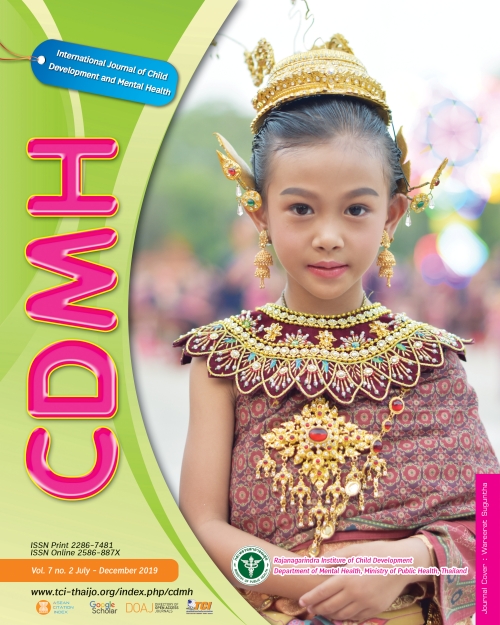Academic Advisors’ Experiences and Needs Working with Students with Disabilities: A Case of Chiang Mai University Academic Advisors and Students with Disabilities
Main Article Content
Abstract
The purposes of this research study were to examine 1) advisors’ experiences and needs working with students with disabilities, including awareness of disability issues, individuals’ comfort levels when dealing with various types of disabilities, concerns about students’ accessibility of advisement services, training on disability laws and service provisions, secrets to advisors’ success, and sensitive issues, and 2) students’ learning challenges; relationships with advisors, professors, and friends; managing finances; health issues; and anxiety. The research instruments included 1) a questionnaire for advisors and 2) an open-ended questionnaire for students with disabilities, and 3) focus group forms for advisors and for students with disabilities. Data was collected and analyzed using frequency, percentage, and interpretative analysis. Questionnaires were distributed to 66 academic advisors, and 62 students with disabilities at 13 faculties. The return rates were 74.2% (n=49) from advisors and 90.3% (n=56) from students. The results showed that only 20.4% (n=10) of the advisors had taken a college course dealing with disabilities, while 89.7% (n=44) had never received training on the Education for Persons with Disabilities Act (2008) or relevant laws. Some advisors also reported knowledge of students’ disclosures of thoughts about suicide and self-harm. Most students reported having some difficulty in learning, making adjustments, accessing transportation, and having limited access to learning materials. The results suggested that improved advisor-student communication experience is vital in order to achieve and foster a better relationship which would ultimately lead to students’ learning success.
Article Details
The authors retain copyright and permit the journal the copyright of first publication
Articles, once having passed the review process and accepted for publication in the CDMH Journal, are copyrighted under the CDMH Journal, Department of Mental Health, Ministry of Public Health. Please be aware distribution of CDMH Journal content for commercial purposes without permission is expressly prohibited. However, distribution with intent to educate, advocate, or spread awareness within the general public and research communities is permitted and encouraged with the understanding that the CDMH Journal Editorial Board do not hold jurisdiction or liability for any accompanying comments, text, or information from third parties, either in favor for or against the original article’s assertions, conclusions, methodology, or content.
References
transition for students with learning disabilities. PRO-ED, Inc., 8700 Shoal Creek Blvd., Austin, TX 48757-6897.
Chickering, A. W., & Schlossberg, N. K. (2001). Getting the Most Out of College. New York, NY: Pearson College Division.
Chiang Mai University. (2019). About CMU. Retrieved from https://www.cmu.ac.th /en/cmu/history (In Thai)
Chiang Mai University-Disabilities Support Services. (2018). Report on
CMU Students with Disabilities. Chiang Mai: CMU-DSS. (In Thai)
D'Alessio, K. A. & Banerjee, M. (2016). Academic advising as an intervention
for college students with ADHD. Journal of Postsecondary Education and
Disability, 29(2), 109-121.
Gamez, S. I. (2017). Moving in, moving through, and moving out: The transitional experiences of foster youth college students. California State University, Long Beach.
Goodman, J., Schlossberg, N. K., & Anderson M. L. (2006). Counseling adults
in transition: Linking practice with theory. New York, NY: Springer Publishing Company.
Gravel, C. A. (2012). Student-advisor interaction in undergraduate online
degree program: A factor in student retention. NACADA Journal, 32(2), 56-67.
Hong, B. S.S. (2015). Qualitative analysis of the barriers college students with
disabilities experience in higher education, Journal of College Student Development, 56(3), 209-226.
Hong, B. S., Ivy, W. F., Gonzalez, H. R., & Ehrensberger, W. (2007). Preparing students for postsecondary education. Teaching Exceptional Children, 40(1), 32-38. Houman, K. M. & Stapley, J. C. (2013). The college experience for students
Houman, K. M. & Stapley, J. C. (2013). The college experience for students
with chronic illness: Implications for academic advising. NACADA
Journal, 33(1), 61-70.
Kilpatrick, S., Johns, S., Barnes, R., Fischer, S., McLennan, D., and Magnussen,
K. (2017). Exploring the retention and success of students with disabilities
in Australian higher education. International Journal of Inclusive
Education, 21(7), 747-762.
Office of the Higher Education Commission. (2018). Report on College
Students with Disabilities. BKK: OHEC. (In Thai)
Office of educational quality development, Chiang Mai University.
(2018). Academic advisor manual for academic year 2018-2019. Chiang Mai: Chiang Mai University. (In Thai)
Preece, J. E., Roberts, N. L., Beecher, M. E., Rash, P. D., Shwalb, D. A., & Martinelli, E. A. (2007). Academic Advisors and Students with Disabilities: A National Survey of Advisors' Experiences and Needs. NACADA Journal, 27(2), 57-72.
Schlossberg, N. K. (1984). Counseling adults in transition. New York, NY:
Springer.
Tee, S. and Cowen, M. (2012). Supporting students with disabilities–Promoting
understanding amongst mentors in practice. Nurse Education in Practice,
12, 6-10.
Tongsookdee, R. and Chaichompu, R. (2016-2017). Education Accommodations
for students with disabilities: Beginning, changing, and sustainable
development. Sikkhana Learning Journal, 4-5(1), 31-51.
Yamnoon, S. (2010). College students with disabilities data base. Retrieved from
https://www.moe.go.th/moe/th/news/detail.php?NewsID=18238&Key
=news2
Young-Jones, A. D., Burt, T. D., Dixon, S., and Hawthorne, M. J. (2013).
Quality Assurance in Education, 21(1), 7-19.


